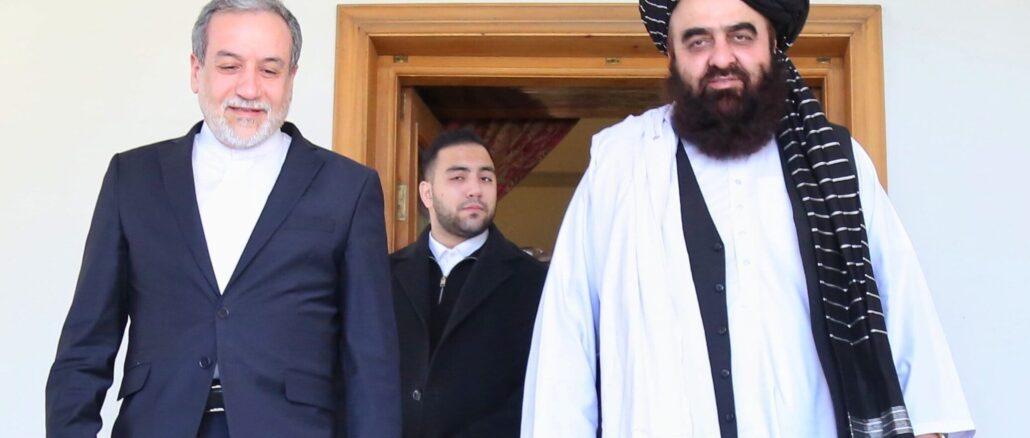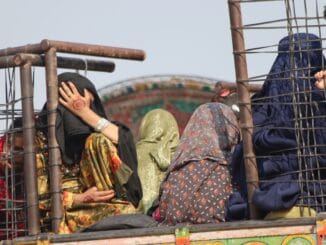
KABUL, Afghanistan : Iranian Foreign Minister Abbas Araghchi arrived in Kabul on Sunday for high-level meetings with the Taliban administration, underscoring Tehran’s continuing engagement with its neighbor despite not formally recognizing the group’s government.
According to a statement from the Taliban’s Ministry of Foreign Affairs, Araghchi met with acting Foreign Minister Amir Khan Muttaqi to discuss a broad range of issues, including economic cooperation, the status of Afghan refugees in Iran, border management, counter-narcotics efforts, and the long-standing Helmand River water dispute.
Focus on Security and Diplomatic Exchanges
Taliban spokesperson Zabihullah Mujahid said Araghchi also held a separate meeting with Taliban Prime Minister Mohammad Hassan Akhund. Akhund welcomed more profound diplomatic and political exchanges during that session, describing Iran and Afghanistan as “brotherly and Muslim nations.” Mujahid quoted Akhund as saying, “Afghanistan seeks to resolve all challenges with Iran through understanding and cooperation.”
Muttaqi, in remarks conveyed by the Taliban’s Foreign Ministry, voiced optimism about strengthening bilateral ties. He urged Iran to address concerns over the treatment of Afghan refugees, reiterating the Taliban’s commitment to ensuring their dignified return.
Helmand River Dispute in the Spotlight
A key topic of discussion was the Helmand River water-sharing disagreement, which has historically strained relations between the two countries. According to the Taliban’s statement, Muttaqi attributed lower water flows partly to regional droughts and climate change. Prime Minister Akhund assured Iranian officials that Afghanistan “has no intention of causing harm to Iran over water issues” and remains open to a diplomatic solution.
Araghchi, for his part, called for technical dialogue and cooperation, emphasizing that stability in Afghanistan directly affects Iran’s security. According to the Taliban’s Ministry of Foreign Affairs, “Security in Afghanistan translates to stability in Iran. “
Iran Urges Enhanced Anti-Narcotics Collaboration
Iran has long been a transit route for drugs originating in Afghanistan, one of the world’s largest producers of opium. Araghchi praised the Taliban’s efforts to combat drug trafficking and proposed more muscular coordination between Iranian and Afghan agencies to address this issue. “Iran is committed to managing the return of undocumented Afghan refugees with dignity and fairness,” Mujahid quoted Araghchi as saying, highlighting one of Tehran’s primary concerns.
Challenges in Afghan-Iran Relations Highlighted During Talks
The visit comes amid persistent tensions over refugee treatment and security. An estimated three million Afghans live in Iran, and their status remains sensitive in bilateral relations. Mujahid conveyed Prime Minister Akhund’s call for Iran to follow “Islamic and brotherly principles” in handling Afghan migrants, including avoiding mass expulsions and addressing reports of detentions and executions that have stirred public anger in Afghanistan.
Another critical issue is the Helmand River water-sharing dispute. Iran has voiced concern about reduced water flows to its eastern provinces, while the Taliban administration cites drought and climate change as the leading causes. Both sides have committed to technical discussions to prevent further escalation, with Prime Minister Akhund reaffirming Afghanistan’s willingness to fulfill its obligations under the Helmand River Water Treaty.
Talks Conclude with a Call for Continued Engagement
At the end of Araghchi’s visit, both delegations agreed to continue high-level exchanges to resolve outstanding concerns. Iranian Foreign Ministry spokesperson Esmaeil Baqaei, in a post on social media before Araghchi’s arrival, called the trip part of Iran’s “neighborhood policy” to address shared security and economic interests. “This visit can be a turning point for leveraging the deep connections between the two nations for mutual benefit,” Baqaei wrote.
The discussions highlight Iran’s delicate balancing act: while Tehran has not formally recognized the Taliban government, it remains one of the few countries to maintain close diplomatic ties with Afghanistan’s current leadership. For both sides, securing regional stability, improving the plight of Afghan refugees, and resolving water disputes are among the most pressing challenges and potential avenues for cooperation in a region still grappling with the aftermath of decades of conflict.
Afghan Students Allege Taliban Canceled Russian Scholarships





Be the first to comment